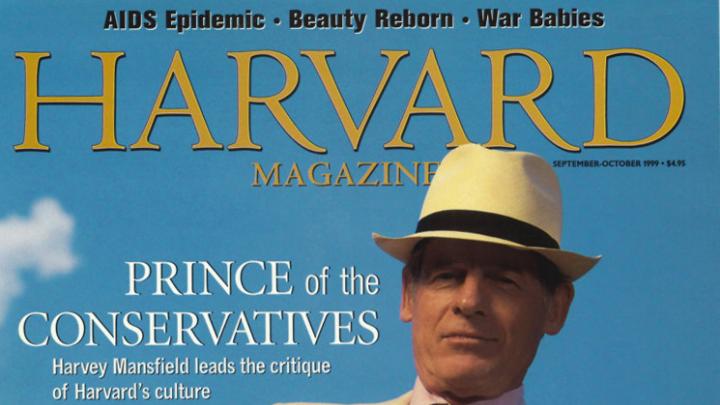Kenan professor of government Harvey Mansfield wrote to this magazine in late November to share a story about the belated, posthumous publication of a dissertation he supervised 44 years ago—that of Delba Winthrop, Ph.D. ’74, who later became his wife. She takes up book three of Aristotle’s Politics, on the subject of democracy, and the balance of the whole versus the parts, so fundamental to self-governance in a democratic society. A conference honoring the book takes place today at the Hoover Institution in Washington, D.C.
~The Editors
My late wife, Delba Winthrop, submitted her doctoral dissertation to the Harvard government department in 1974. She died (of cancer) in 2006. She had been on the Harvard staff as administrator of the Program on Constitutional Government (a small fund I direct to give a boost to conservative speakers and visitors at Harvard) and as a lecturer in the Harvard Extension School for about 25 years. We were married in 1978.
Her dissertation has just been published by the University of Chicago Press, with a foreword by me, every word of hers unchanged. A conference to honor it will take place at the Washington office of the Hoover Institution on December 10.
Publishing one’s dissertation is, as we all know, a common beginning for those who live their lives under the rule—or is it tyranny?—of “publish or perish.” But it is a rare event, and perhaps an evasion of the rule, that it be done after one has perished. A famous scholar might be so honored, but not someone whose modest life production was about a dozen articles on Aristotle, Tocqueville, and Solzhenitsyn, for whom this publication will be the founding, not the consequence, of a reputation.

For this dissertation, completed by Delba at the age of 28, is altogether stunning in its maturity and remarkable for its originality. This is a husband’s judgment, to be sure, but one endorsed by reviewers for the University of Chicago Press. The book is titled Aristotle: Democracy and Political Science, where readers can find in my foreword the reasons why it is so good. She was able to hint at them in her own “Note on the Translation,” printed as an appendix, which is short and to the point, and gives the gist of her book without straying into self-praise. Her work is a translation and line-by-line interpretation of Book 3 of Aristotle’s Politics, and it shows why this text is the crucial object of study by political science in support of democracy.
I supervised this dissertation and knew it was something terrific, but I doubted it could be published because it was so terse and so far from the mainstream. It had received the Leo Strauss Award from the American Political Science Association as the best dissertation in political philosophy in 1974, but this was a citation of contested value for those who disagreed with Leo Strauss. Nonetheless, I tried to get her to revise it for publication during her lifetime, and she always refused, saying she needed to know more Aristotle (an infinite task). Then, 10 years after she died and at the urging of friends, I put it up at Chicago (my publisher for the most part), and to my great surprise, it sailed through, praised to the skies. It would have been more Harvard if this Harvard dissertation were being published by Harvard University Press, but it’s an honor that the Harvard government department will appreciate. And it ought to cause a commotion among Aristotle scholars, as well as start waves that ought to reach the wider circles of thoughtful citizens in democracies. These are two “oughts” of the kind that in our age of haste sometimes takes time to be fulfilled.
What does Delba Winthrop find and propose? She punctures the complacency with which we defend democracy as the best or even the only legitimate form of government, and turns to Aristotle for justification of democracy. In Aristotle’s day and in ours, democrats want inclusiveness; they want above all to include everyone as part of a whole. But what is a whole? This is a question for both politics and philosophy, and Winthrop shows that Aristotle pursues the answer in his Politics. She uncovers his insights into politics from philosophy, and even more his insights into philosophy from politics. The assertive quality of political speech, the argumentative character of argument, is shown to have a crucial role in philosophy itself, where human reason must claim its due as a contribution to the whole of the universe. Political science has the double task of teaching citizens how to include everyone and of teaching those who want to understand the thought that sustains democracy.
This central theme encompasses a multitude of proposals that will be news to the very many Aristotle scholars of all types and times whom she addresses. Her interpretation begins with the difficult ambiguities in Aristotle’s text and explains them as necessary to his meaning, not accidents in the supposed notes of his students. Her stated motto is, “Nothing is so obscure that it is not meant to be found,” and this guides her penetrating imagination to many hints hitherto unnoticed or dismissed in the text. Hers is an interpretation in the fullest sense, so much that—at least for the Politics—readers will have the sensation of having entered a new realm of surprising coherence and exactness. Winthrop wants to restore the eminence Aristotle once enjoyed that has been forgotten, more often than knowingly rejected, by modern philosophers and political scientists. This is a large claim that I urge readers to investigate.
One more point in my regard. Strangely enough, this is the second dissertation by a woman I love that I have had the unhappy occasion to see through to posthumous publication. The first was written by my daughter, Mary Mansfield, who died in an auto accident in 1989 just after finishing her Ph.D. at Berkeley, the summer before she was to take up an assistant professorship in history at Stanford. That book, The Humiliation of Sinners: Public Penance in Thirteenth-Century France, was published by Cornell University Press in 1995. One of her advisors was Thomas Bisson, who afterward went from Berkeley to the history department at Harvard, where he is now emeritus. The book won two prizes (from the American Historical Association and the Medieval Academy), which is two more than any book of mine has received! So the books I am proud of remind me of what I must be modest about.









